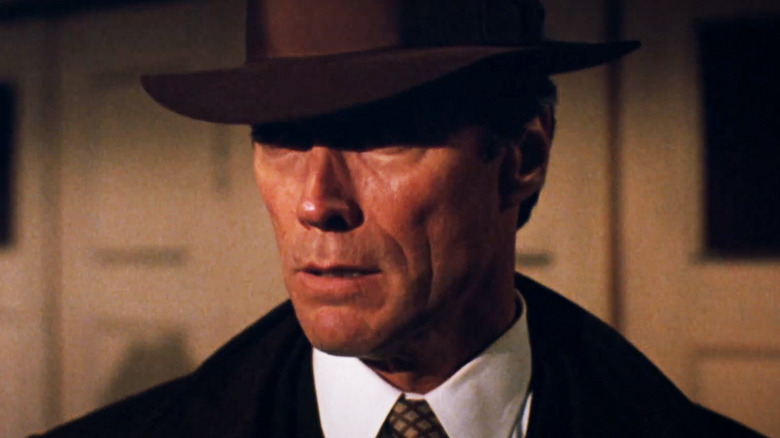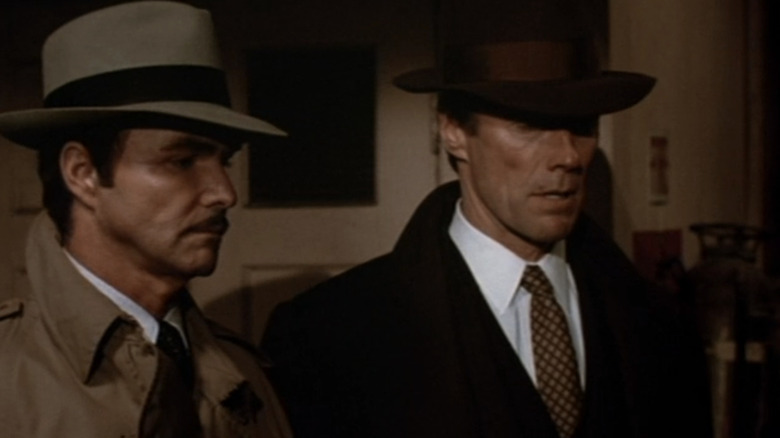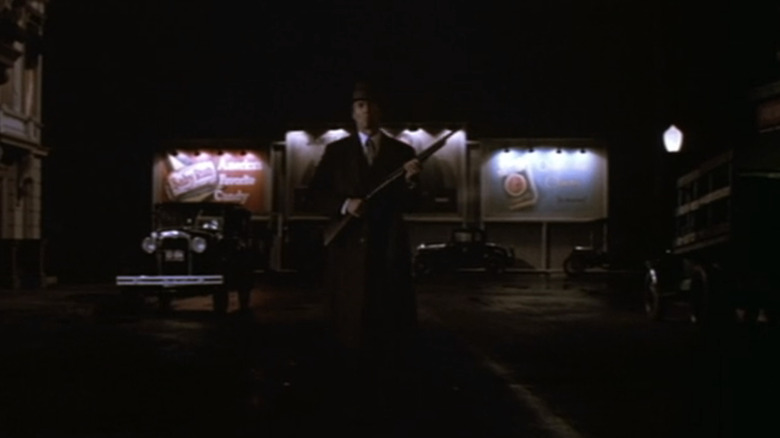Roger Ebert Absolutely Hated A Forgotten Clint Eastwood Gangster Movie
Clint Eastwood is a Hollywood legend but even actors and directors of his stature have had their share of missteps. Eastwood's best roles represent truly seminal characters in cinema history. His worst, however, are no better than any others. Well, maybe better than John Travolta, who has a full seven total failures with a 0% score on Rotten Tomatoes. According to that same website, Eastwood's worst film, with a lowly 13% RT score, is 1955's "Revenge of the Creature," followed by 1980's "Any Which Way You Do."
His third worst, according to the Tomatometer, is 1984's "City Heat," and it seems Roger Ebert would be in violent agreement with this ranking. In fact, the celebrated critic would likely argue that "City Heat" deserves to be the lowest-rated of all Eastwood's projects, as he wrote a scathing review of the film upon its release in which he seemed genuinely upset that the screen legend had stooped so low.
Eastwood himself wasn't shy about sharing his opinions on his own filmography. He once named a 1950s western as "the worst film ever made." But even that can't compare to the hatred Ebert harbored for "City Heat," which also had the tragic distinction of making just $38.3 million against a $25 million budget. So, what went wrong and what upset the Chicago Sun-Times reviewer so much?
Roger Ebert seemed to find City Heat personally offensive
By the 1980s, Clint Eastwood had already become a legend of cinema, and as such could pretty much do whatever he wanted — which is basically how he spent that decade. Sadly, doing so didn't do much to preserve his legacy, and Eastwood's career hit rock bottom by the end of the decade, right before "Unforgiven" rescued it. "City Heat" was one major misstep on the way to that '80s career low.
The film is set in 1933 and follows private investigator Mike Murphy (Burt Reynolds) whose partner, Dehl Swift (Richard Roundtree), is murdered by goons working for mobster Primo Pitt (Rip Torn). Murphy calls on his police partner, Lieutenant Speer (Eastwood), who isn't Murphy's biggest fan, but agrees to help him solve Swift's murder and get revenge. As the trailer put it, "Clint is a street-smart flatfoot. Burt is a wisecracking gumshoe, and together the heat is on." Much of the movie's dialogue matches this attempt at gritty film noir patter that comes off less as hard-boiled and more as self-parody.
Roger Ebert certainly thought so anyway. The critic was unimpressed by "City Heat" to say the least, asking in his 1984 review, "How do travesties like this get made?" For Ebert, the film tarnished what was a close to pristine filmography for Eastwood, who according to the reviewer allowed "his incomparable screen persona to be parodied" in the movie, leading to a historic dud of a feature that Ebert seemed to find personally offensive.
City Heat was doomed from the outset
Roger Ebert wasn't the only critic to despise "City Heat." Indeed, the movie currently bears a 22% rating on Rotten Tomatoes, though that score is based on just 18 reviews. Of those 18, six are from top critics, and only two actually gave the film a positive review. Only David Kerr of the Chicago Reader seemed to be as incensed as Ebert with the "City Heat," however, describing the feature as "insufferable — grotesque, chaotic, demoralized." Something about Eastwood's buddy crime comedy clearly upset Chicago-based reviewers, then, as the other negative takes aren't quite so harsh.
Behind-the-scenes problems appear to have contributed to the fate of "City Heat" as a critical failure. The film was written by Blake Edwards and directed by Richard Benjamin, but Edwards was originally set to direct. However, Edwards was removed from directorial duties early in production due to what were deemed "creative differences" with Eastwood, clearing the way for Benjamin. Things didn't get off to a great start, then, and Ebert suspected these off-camera issues contributed to the film's overall quality. "I have a feeling," he wrote, "the problem starts at the level of negotiations, in which everybody protects his own turf, and the movie suffers."
But "City Heat" suffered from more than behind-the-scenes squabbles. For Ebert, the movie wasn't in on its own joke, with the reviewer writing, "The 'Dirty Harry' movies themselves border on parody — that's part of their charm – but they know what they're doing. 'City Heat' is a movie in which people almost obviously don't have a clue." Meanwhile, the pairing of major stars Eastwood and Burt Reynolds was expected to do much of the heavy lifting in terms of box office receipts, but it just simply didn't. The script didn't allow either to project the necessary charisma or shared chemistry, and "City Heat" ended up a blot on both actors' esteemed filmographies. That must have been a tough pill to swallow for Reynolds, who just so happened to have starred in one of his worst westerns thanks to none other than Eastwood himself all the way back in 1966. "City Heat" didn't exactly make up for that blunder, and if you asked Roger Ebert, just made everything worse.


